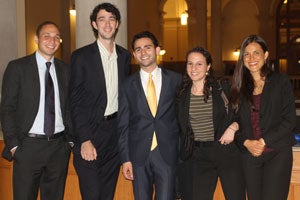Just two months after landing a major victory in the Massachusetts Supreme Judicial Court on behalf of homeowners fighting eviction, the Harvard Legal Aid Bureau (HLAB) was back before the high court last week seeking more protections for people with homes in foreclosure. The court’s decision, expected to come down in several months, could lead to greater accountability for lenders trying to foreclose.
Sam Levine ’12, president of the HLAB’s Foreclosure Task Force, argued before the high court that a bank or other entity seeking to foreclose on a house can’t do so unless it holds both the mortgage and the promissory note underlying the debt. In this case, Green Tree Servicing conducted a foreclosure sale on the home of a Boston woman even though it was owed no debt and held nothing more than the assignment of a mortgage securing a loan that the woman received from a bank.
The case, Eaton v. Fannie Mae and Green Tree Servicing, LLC, is being closely watched by observers and analysts of the foreclosure crisis nationwide. Levine first began working on the case over a year ago when the homeowner, Henrietta Eaton, who lives in the house with her three grandchildren, became an HLAB client after HLS students in Project No One Leaves knocked on her door to inform her that her home was in foreclosure, and offered to represent her. HLAB won a preliminary injunction in Superior Court in June to stop the foreclosure, but the other side appealed to the state Appeals Court. Then, in August, the high court took the unusual move of asserting jurisdiction over the case before the appeals court had ruled.
That gave a team of HLAB students only two weeks to write and file a brief, and just an additional 10 days for Levine to prepare to argue. They worked long hours under the supervision of David Grossman ’88, clinical professor and director of HLAB, and Esme Caramello ’99, HLAB’s assistant director. Levine practiced his argument at least 10 times before fellow students and his supervisors at HLAB, among others. Including Levine, students on the brief-writing team were Genevieve Bonadies ’13, Lena Silver ’13, Tim Visser ’13, and Gregory Pruden ’13. “It was a really great collaboration,” says Levine.
HLS’s Wilmer Hale Legal Services Center was also involved, with Max Weinstein, a clinical instructor in the center’s predatory lending practice, filing an amicus brief on behalf of the National Consumer Law Center, focusing on important consumer protection concerns underlying HLAB’s position.
“The Legal Aid Bureau’s intensive work in Boston’s neighborhoods and the local trial courts on behalf of the individual victims of the foreclosure crisis frequently presents us with the opportunity to have a more widespread effect on the problem,” said Grossman. “In addition to the potential benefit to other homeowners facing foreclosure, this case also helped the team of students involved understand more deeply the interrelationship among community organizing, individual casework, and impact litigation.”
Levine agrees. “It was such a privilege to be able to do this as a third-year law student,” he said, a point driven home by a relative of one of the attorneys for the other side. “He came up to me before the argument and said he’d been practicing for 40 years and he’d never had the opportunity to argue before the SJC.”
In the past year, in the midst of the foreclosure crisis, the SJC has made a number of important rulings, all involving the HLS clinical program, which has been at the center of fighting on behalf of homeowners. In August, the court unanimously ruled in favor of HLAB’s argument that lenders looking to evict a tenant or homeowner after foreclosure must show that the foreclosure was valid, and held that the state Housing Court does have jurisdiction over a challenge to an already-completed foreclosure. And last January, the court found that banks had wrongly foreclosed on two homes because they could not prove that they owned the mortgages at the time of the foreclosure sales. The Legal Services Center’s Weinstein, co-counsel in the case, represented one of the mortgagers, Antonio Ibanez. The court’s decision received national attention.
